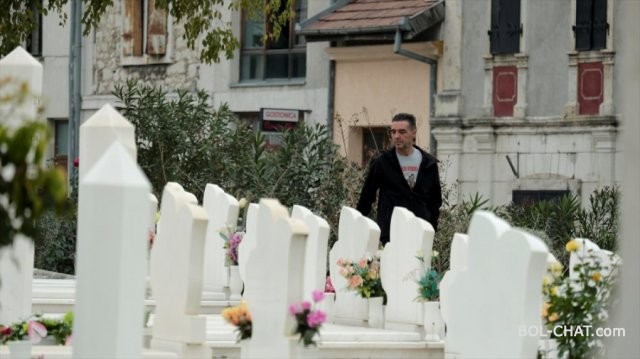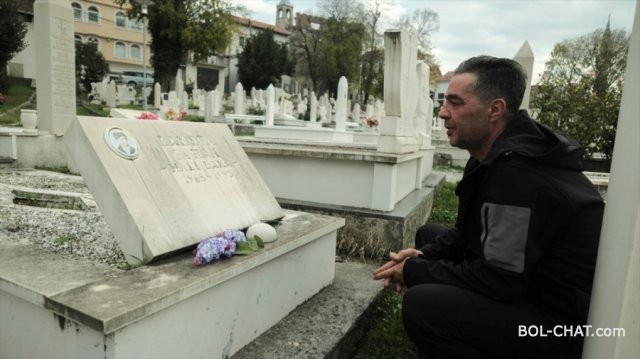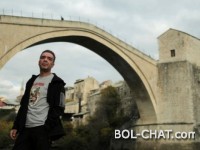"Let God never be repeated!"
The period of aggression on Bosnia and Herzegovina and the war-affected Mostar, father and two sons were spent on three warring parties, the Republika Srpska Army (VRS), the Army of Bosnia and Herzegovina and the Croatian Defense Council (HVO). No, these are not parts of the scenarios for a well-designed Hollywood blockbuster, it's about the life story of 50-year-old Mostar, Zoran Lakete, writes Anadolu Agency
Zoran was 25 years old when he slammed the war to his door and practically stopped his youth in his native Mostar. The man who had many youthful dreams in front of him, overnight, was on the battlefield.
It sounds unbelievable, but it's true. Zoran spent the war in Mostar as a member of the HVO, his brother Goran fought in the ranks of the BiH Army, and that the paradox was higher, their father Ratko was in the ranks of the RS army, which also acted in the area of Mostar. Brother Goran was killed in August 1993, fired from HVO fireplaces by HVO soldiers. He was killed by a military shell in whose ranks his brother Zoran was.
It is impossible to listen to Zoran's story, while not asking himself whether it is possible that the father and two sons fought each other in a relatively small town. This story, apart from being a family tragedy itself, is also the most picturesque example of how much war, and all that it carries with it, is nothing but evil and a great absurdity.

Sabahudin, Zoran, or Ranko -
I call Sabahudin, Zoran or Ranko, I reside Lacet, all of these names have the same meaning, since all three of them are born with dawn or even - words that Zoran begins our conversation.
For the war in the early 1990s, which calls the peasant rebellion, Laketa says it was nothing but a ridiculous war. For this reason, as he points out, he never wanted to tell his tragic life story so that he would succumb to someone. Nevertheless, it emphasizes that it is essential to transmit it to the whole world, so that it would never be repeated to anyone.
- Yes, my story needs to know the whole world. My brother was in the Army of Bosnia and Herzegovina, I was in the HVO, my father was mobilized in the Army of Republika Srpska. Are we now talking about patriotism, patriotism or patriotism? So were these our ideals? Not, " Lacetti said.
He recalls pre-war life in Mostar, and says there was no Bajram, Christmas, or Easter, without having gone to his neighbor, or that his neighbor had not visited him.
- They say that all this yesterday was something forbidden, at that time dark and dark. I do not know then who lights this light. I graduated from a school for a mechanic, hoping to work in Sokol (Yugoslav factory of aircraft in Mostar). But since 1992 I have been in the Bureau and I am a citizen of my unique Bosnia and Herzegovina. At that time, in the flower of my youth, when I was 25, I became a soldier, I need someone to hate, shoot somebody, kill in the 'fratricidal war', and that is the fact that I was on one, my brother on the other, and the father on the third page. All of this happened to my family, my friends, my neighbors, brothers and sisters. I only had one brother, one father, one mother, all of them unfortunately today are dead, and I'm still alive a bit, "says Laketa.
Today, a quarter of a century later, she asks herself how it was possible that members of an ordinary working-class family, who lived from a working-class wage whose children had a happy childhood, free education, were part of an unhappy conflict.
- We are Orthodox believers, although I did not even know that we were until all of this started. Eh, since we are Orthodox, we should be as if we are going to the Serbian side. So how do I get on the side of the page, and I see the cockades there. I would argue that it was five hours, because I believed in those ideals, I believed in brotherhood and unity, that all people were the same, that we all had one together, that we worked and lived. Unfortunately, everything turned out to be the opposite - Lacetti's story.
He remembers on May 9, that crucial moment, when his story begins.
-This moment of breaking when everything started, it's the hardest to tell. It was a ridiculous war for me. Can you imagine one morning waking up and you can not come back across the street, because it is a new front line, where you can not pass through and my brother and mother are there. Simply, there's a blockade. I was in 1992, after I was having a good time with my husband today, with whom I live for 25 years and I have two daughters, from Zaliq, who is in the so-called. on the left bank of Mostar, went to the right side of Balinovac to be with my wife who was then 23 years old. At a certain time, more precisely on May 9, 1993, there was a situation when the war in Mostar began, I could no longer move to the other side, into my apartment, and then everything went in the opposite direction. It's that difficult explanatory moment. Simply, you wake up and there is a barrier in front of you, visible or invisible,- believes Laketa.

Hiding the brother's best friend
As he and brother Goran did not want to be forcibly mobilized into the army, which was not their JNA in the first conflicts in Mostar, Laketa says they decided to stay in the mixed Mostar. He went to his wife to Balinovac, and his brother remained with best friend Adis Kadric called Ado, in the eastern part of Mostar.
- What is especially interesting, it all began on May 9, and on May 8, the day before, we were at a wedding. Married our friend, I came to Cernica (downtown) after my brother and Adis. Brother said that he would not go because he did not have the money to donate young men, he always wanted that to be respected, so Adis and I started. Brother stayed, and that was our last encounter. So, on the 8th of May, about the last five o'clock in the afternoon I saw him for the last time. Adis and I spent the night at the wedding, but in return we noticed a lot of military vehicles, rifles, pistols, complete arsenals, Lacetti recalls.
They realized that something was going on a lot, and considering that Zoran's apartment was nearest, they sheltered him, to wait and find out what was going on. Then, at some point, people were bought. Laketa says that ethnic cleansing of Mostar begins on May 9th. The neighbor's neighbor issues, the neighbor's neighbor fights, buying people in pajamas has begun.
-Adis was with me in the apartment, but he did not manage to survive and confirm this story. He was with me for about 10 days. We shared what we had, what was, cans, some humanitarian aid. Adis was so frightened about me and my family, because my wife was pregnant at that time, he decided to risk his life just because somebody would not fall for me tomorrow and ask who I hide. He was great for me, because he risked himself to keep an eye on me and my unborn child. He left the line on the line and managed to return to my brother. Fate thus wanted both of them to die within a space of 10 days - Lacette said.
The conversation with Zoran is being conducted in Mostar's Šantićeva street, which during the most violent conflicts in Mostar was a separation line. The buildings on this street are still visible scars of war.
Two brothers on two fronts shared one street
On the question of how during his stay at the HVO's frontage he looked at the fact that on the other hand his brother was, that ultimately could come into direct contact and shoot at each other, Lacette answers that all this was a great trauma.
- You know, everyone around you says behind your back, you can not say anything in your face. 'Look at the Serb, he came here with us, and his brother is in his balians'. It was a severe trauma - emphasizes Laket.
He also added that he had constant fear during his stay in the battlefield, in the sense that his brother was there across the street and that one day they could be directly confronted.
- What to get a pipe on the pipe, I would ride on him, he to me, we both would have died. Brother is it, blood is not water. We are currently in Šantićeva Street, where there was a line of delimitation. It was not a video game, it was a cruel life. Only one street shared us. Imagine that brother came to brother, as it could have happened. Funny. It's hard to explain to someone and transmit this emotion, " Laketa said.
Brother Goran
was shot by HVO projectors Brother Goran was 24 years old when he died on August 6, 1993, and he was killed by a mortar shell fired from the position of the HVO on Hum hill, above Mostar. On that day, according to Zoran's words, Goran went to the dunas to his fellow Amir Shato.
"They were there at Carina, where they would go to the janazu, someone saw it from my Hummers. I can not deny that man who fired that grenade, what will I do, and someone ordered him to do it. I could hate, and I was on that side too. A mortar shell of 120 mm has been dropped, which has been massaged by them, " Laketa said.
He heard about his brother's death only after seven days, via Radio Mostar.
- I could not believe, 'Seven days after the death of Lakete Goran who was killed by a grenade on August 6th, along with him, they were killed ...' I could not believe what I heard. Friends come to me, they express my sympathy, and only then I become a little more aware. You can not leave your brother at a funeral, you can not see the embarrassment of a mother who lost her son, but you have to carry it in your own depth, in a small human being. You do not know how your mother is, it's a trauma. That night, I can not say I cried, it was some unarticulated screams until about four or five in the morning. It was very difficult for me that I could not leave my brother at the funeral, "Lacetti said.
Zoran says that today, 25 years after the war, new generations are being raised that are being raised in a special way. As he adds, today in Mostar there are young people who have never seen the Old Bridge or the Partisan cemetery, the cultural and historical monuments of this city.
He took us to Šehitluk, the Mostar Shaheed carnival in the old part of the city, where his brother Goran was buried.
Next to the city, Adis was buried, as were many of his colleagues. Grabbing grass from the grave, Zoran recalls his brother. Emotions overwhelmed him, crying. As he speaks of his brother, it is possible to feel the weight and pain in every word of his. Still, it seems that he is much more painful in his silence and the unspoken one, while in silence he looks deeply into a tombstone with the carved name of Goran Lakete.
At the end of his story, Laketa sends a short and clear message "God forbid never to be repeated! "
- 11 Dec, 2017
- 2445 views
- No comments


